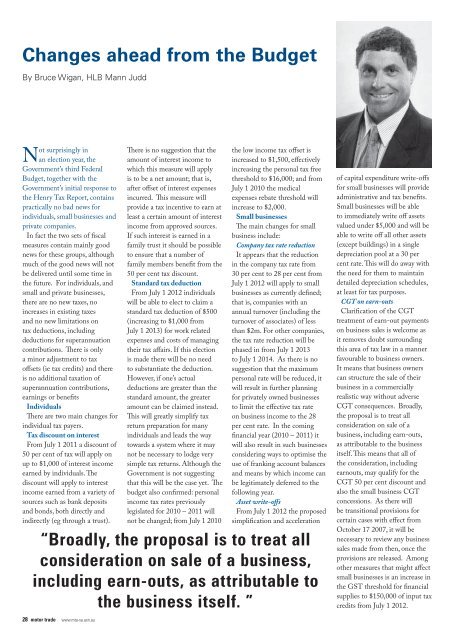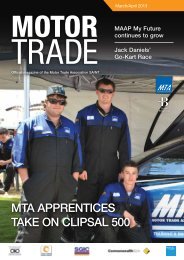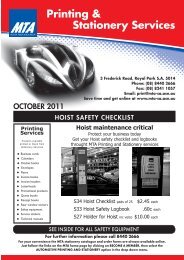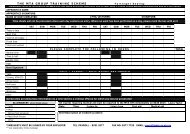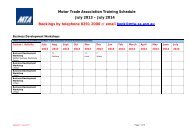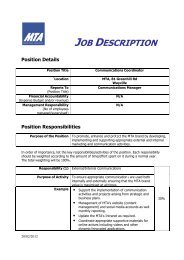July/August - MTA
July/August - MTA
July/August - MTA
You also want an ePaper? Increase the reach of your titles
YUMPU automatically turns print PDFs into web optimized ePapers that Google loves.
Changes ahead from the Budget<br />
By Bruce Wigan, HLB Mann Judd<br />
Not surprisingly in<br />
an election year, the<br />
Government’s third Federal<br />
Budget, together with the<br />
Government’s initial response to<br />
the Henry Tax Report, contains<br />
practically no bad news for<br />
individuals, small businesses and<br />
private companies.<br />
In fact the two sets of fiscal<br />
measures contain mainly good<br />
news for these groups, although<br />
much of the good news will not<br />
be delivered until some time in<br />
the future. For individuals, and<br />
small and private businesses,<br />
there are no new taxes, no<br />
increases in existing taxes<br />
and no new limitations on<br />
tax deductions, including<br />
deductions for superannuation<br />
contributions. There is only<br />
a minor adjustment to tax<br />
offsets (ie tax credits) and there<br />
is no additional taxation of<br />
superannuation contributions,<br />
earnings or benefits<br />
Individuals<br />
There are two main changes for<br />
individual tax payers.<br />
Tax discount on interest<br />
From <strong>July</strong> 1 2011 a discount of<br />
50 per cent of tax will apply on<br />
up to $1,000 of interest income<br />
earned by individuals. The<br />
discount will apply to interest<br />
income earned from a variety of<br />
sources such as bank deposits<br />
and bonds, both directly and<br />
indirectly (eg through a trust).<br />
There is no suggestion that the<br />
amount of interest income to<br />
which this measure will apply<br />
is to be a net amount; that is,<br />
after offset of interest expenses<br />
incurred. This measure will<br />
provide a tax incentive to earn at<br />
least a certain amount of interest<br />
income from approved sources.<br />
If such interest is earned in a<br />
family trust it should be possible<br />
to ensure that a number of<br />
family members benefit from the<br />
50 per cent tax discount.<br />
Standard tax deduction<br />
From <strong>July</strong> 1 2012 individuals<br />
will be able to elect to claim a<br />
standard tax deduction of $500<br />
(increasing to $1,000 from<br />
<strong>July</strong> 1 2013) for work related<br />
expenses and costs of managing<br />
their tax affairs. If this election<br />
is made there will be no need<br />
to substantiate the deduction.<br />
However, if one’s actual<br />
deductions are greater than the<br />
standard amount, the greater<br />
amount can be claimed instead.<br />
This will greatly simplify tax<br />
return preparation for many<br />
individuals and leads the way<br />
towards a system where it may<br />
not be necessary to lodge very<br />
simple tax returns. Although the<br />
Government is not suggesting<br />
that this will be the case yet. The<br />
budget also confirmed: personal<br />
income tax rates previously<br />
legislated for 2010 – 2011 will<br />
not be changed; from <strong>July</strong> 1 2010<br />
the low income tax offset is<br />
increased to $1,500, effectively<br />
increasing the personal tax free<br />
threshold to $16,000; and from<br />
<strong>July</strong> 1 2010 the medical<br />
expenses rebate threshold will<br />
increase to $2,000.<br />
Small businesses<br />
The main changes for small<br />
business include:<br />
Company tax rate reduction<br />
It appears that the reduction<br />
in the company tax rate from<br />
30 per cent to 28 per cent from<br />
<strong>July</strong> 1 2012 will apply to small<br />
businesses as currently defined;<br />
that is, companies with an<br />
annual turnover (including the<br />
turnover of associates) of less<br />
than $2m. For other companies,<br />
the tax rate reduction will be<br />
phased in from <strong>July</strong> 1 2013<br />
to <strong>July</strong> 1 2014. As there is no<br />
suggestion that the maximum<br />
personal rate will be reduced, it<br />
will result in further planning<br />
for privately owned businesses<br />
to limit the effective tax rate<br />
on business income to the 28<br />
per cent rate. In the coming<br />
financial year (2010 – 2011) it<br />
will also result in such businesses<br />
considering ways to optimise the<br />
use of franking account balances<br />
and means by which income can<br />
be legitimately deferred to the<br />
following year.<br />
Asset write-offs<br />
From <strong>July</strong> 1 2012 the proposed<br />
simplification and acceleration<br />
“Broadly, the proposal is to treat all<br />
consideration on sale of a business,<br />
including earn-outs, as attributable to<br />
the business itself. ”<br />
28 motor tradewww.mta-sa.asn.au<br />
of capital expenditure write-offs<br />
for small businesses will provide<br />
administrative and tax benefits.<br />
Small businesses will be able<br />
to immediately write off assets<br />
valued under $5,000 and will be<br />
able to write off all other assets<br />
(except buildings) in a single<br />
depreciation pool at a 30 per<br />
cent rate. This will do away with<br />
the need for them to maintain<br />
detailed depreciation schedules,<br />
at least for tax purposes.<br />
CGT on earn-outs<br />
Clarification of the CGT<br />
treatment of earn-out payments<br />
on business sales is welcome as<br />
it removes doubt surrounding<br />
this area of tax law in a manner<br />
favourable to business owners.<br />
It means that business owners<br />
can structure the sale of their<br />
business in a commercially<br />
realistic way without adverse<br />
CGT consequences. Broadly,<br />
the proposal is to treat all<br />
consideration on sale of a<br />
business, including earn-outs,<br />
as attributable to the business<br />
itself. This means that all of<br />
the consideration, including<br />
earnouts, may qualify for the<br />
CGT 50 per cent discount and<br />
also the small business CGT<br />
concessions. As there will<br />
be transitional provisions for<br />
certain cases with effect from<br />
October 17 2007, it will be<br />
necessary to review any business<br />
sales made from then, once the<br />
provisions are released. Among<br />
other measures that might affect<br />
small businesses is an increase in<br />
the GST threshold for financial<br />
supplies to $150,000 of input tax<br />
credits from <strong>July</strong> 1 2012.


